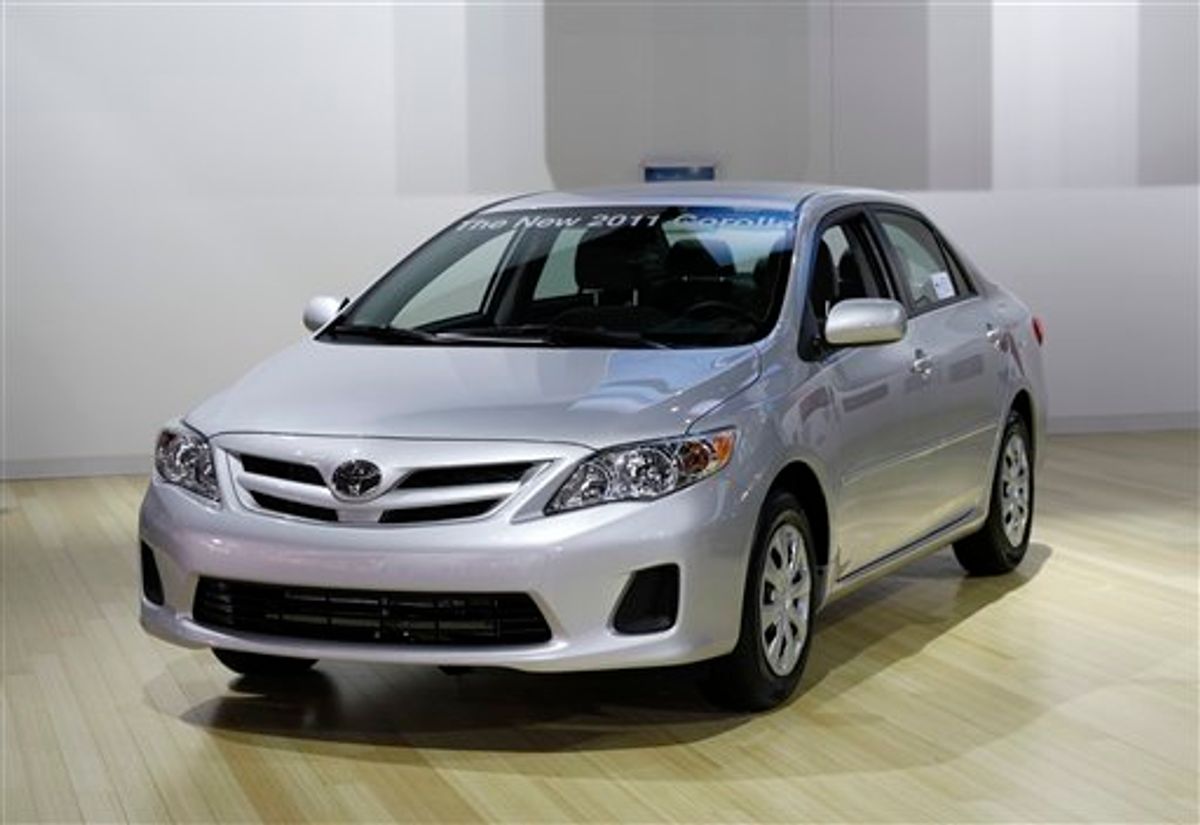The Obama administration's investigation into Toyota safety problems found no electronic flaws to account for reports of sudden, unintentional acceleration and other safety problems. Government investigators said Tuesday the only known cause of the problems are mechanical defects that were fixed in previous recalls.
The Transportation Department, assisted by engineers with NASA, said its 10-month study of Toyota vehicles concluded there was no electronic cause of unintended high-speed acceleration in Toyotas. The study, which was launched at the request of Congress, responded to consumer complaints that flawed electronics could be the culprit behind Toyota's spate of recalls.
"We enlisted the best and brightest engineers to study Toyota's electronics systems and the verdict is in. There is no electronic-based cause for unintended acceleration in Toyotas," Transportation Secretary Ray LaHood said in a statement.
Toyota has recalled more than 12 million vehicles globally since fall 2009 to address sticking accelerator pedals, gas pedals that became trapped in floor mats, and other safety issues. The recalls have posed a major challenge for the world's No. 1 automaker, which has scrambled to protect its reputation for safety and reliability.
Toyota did not immediately comment on the report. Shares of the automaker climbed on the New York Stock Exchange following the news. Toyota shares were up more than 4 percent, to 89.00 in mid-afternoon trading.
Toyota paid the U.S. government a record $48.8 million in fines for its handling of three recalls. The company has said it has not found any flaws in its electronic throttle control systems and said the previously announced recalls have addressed the safety concerns.
LaHood said NASA engineers "rigorously examined" nine Toyotas driven by consumers who complained of unintended acceleration. NASA reviewed 280,000 lines of software code to look for flaws that could cause the acceleration. Investigators tested mechanical components in Toyotas that could lead to the problem and bombarded vehicles with electro-magnetic radiation to see whether it could make the electronics cause the cars to speed up.
A preliminary part of the study, released last August, failed to find any electronic flaws based on a review of event data recorders, or vehicle black boxes.
Despite its findings, LaHood said the National Highway Traffic Safety Administration was considering new regulations to improve safety. They include requiring brake override systems on all vehicles, standardizing keyless ignition systems and requiring event data recorders, or vehicle black boxes, on all new vehicles.
Transportation officials said they would also consider conducting more research on electronic control systems and review the placement and design of accelerator and brake pedals.
In Tokyo on Tuesday, Toyota reported a 39 percent slide in quarterly profit but raised its full-year forecasts for earnings and car sales. It is a mixed picture for the automaker, which is enjoying booming sales in high-growth markets in Asia, Africa and South America, while facing lingering worries about quality lapses in the U.S.
In addition to the recalls, Toyota began installing brake override systems on new vehicles. The systems automatically cut the throttle when the brake and gas pedals are applied at the same time. The company also created engineering teams to examine vehicles that are the subject of consumer complaints and appointed a chief quality officer for North America amid complaints its U.S. division did not play a large enough role in making safety decisions.
Consumer advocates and safety groups raised concerns that flawed electronics could be causing unwanted acceleration in the Toyotas. They have questioned the reliability of the event data recorders studied by the government, saying they could be faulty or fail to tell the whole story of the individual crashes.
Toyota's safety issues received broad attention from the government after four people were killed in a high-speed crash involving a Lexus near San Diego in August 2009.
NHTSA has received about 3,000 reports of sudden acceleration incidents involving Toyota vehicles during the past decade, including allegations of 93 deaths. NHTSA, however, has confirmed just five of them.
Congress considered sweeping safety legislation last year that would have required brake override systems, raised penalties on auto companies that evade safety recalls and given the government the power to quickly recall vehicles. But the bills failed to win enough support, and it remains unclear if Congress will pursue similar legislation before the 2012 elections.
The National Academy of Sciences is conducting a separate study of unintended acceleration in cars and trucks across the auto industry. The panel is expected to release its findings this fall.

Shares